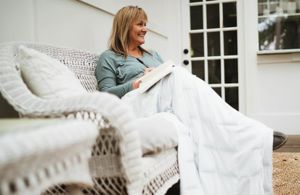Thank you to Weighting Comforts for donating a FREE weighted blanket to Writing and Wellness newsletter giveaways! This was an amazing, high quality gift. Congratulations to Deborah C, the lucky winner!
Writers can be an anxious bunch.
There’s just so much to worry about! Not only must we keep track of everything we’ve got going on, from writing to editing to publishing to marketing and more, there’s the inherent fear that’s part of the whole writing thing itself.
If I put this out there, what will they think?
Do I really have the talent for this?
I’m afraid this story isn’t any good.
She’s going to reject it, I know she will.
Should I really write about that? What will so-and-so think?
If you’re a highly sensitive person, which many writers are, anxiety may simply be a part of daily life. If you’re off to a book signing, conference, workshop, or some other event, you know that anxiety will be riding shotgun with you a lot of the time, so you might as well make room.
Then there are the middle-of-the-night worries about whether you missed any typos in the galleys, if the cover is going to turn out like you hope, if the launch will be successful, or what the first few reviews will say.
Yep. Writers have lots to worry about, and worry we do. There are a variety of things you can do to cope. (I’ve got several ideas for you in a previous post, “10 Solutions for Writers Who Worry Too Much.”)
But there’s a new one out there you probably haven’t tried. And there’s some good evidence showing it may really help.
What are we talking about?
A weighted blanket. A blanket that when you put it over you, feels “like a hug,” manufacturers say. A blanket specifically designed to help you feel calm.
Okay, but isn’t that just to help you sleep better?
Yes, it can help with that, but that’s not all it can do. Here’s why writers—particularly those who struggle with anxiety, worry, and/or nervousness (are there any writers who don’t?)—may want to check it out.
 How Weighted Blankets Came to Be
How Weighted Blankets Came to Be
Weighted blankets got their start as a therapy device for children suffering from the effects of autism, attention-deficit disorder (ADHD), and sensory disorders, which often include anxiety.
They’ve also been used for adults and children suffering from anxiety disorders, or as helpful tools for other patients that may be feeling overwhelmed, nervous, or stressed because of recent traumas or events.
Over the past several years, though, these blankets have become more popular as helpful solutions for those with generalized anxiety, insomnia, and other related issues, or who may be struggling with stressful periods in their lives.
 What Are Weighted Blankets?
What Are Weighted Blankets?
These are blankets made particularly to have a sense of weight about them. How much weight depends on the type of blanket and its size. They’re designed to be warm, yes, but more importantly, to provide a steady, gentle pressure to the person, which therapists say mimics the feelings of being held or hugged.
The blankets are also said to create a similar sensation to “deep pressure touch,” a type of touch or massage that is believed to help calm the nervous system. The development of weighted blankets has mirrored the development of similar materials for anxious pets, such as the “Thunder Shirt.”
Wearing or lying under the weighted blanket is said to produce a sensation that creates a positive effect on anxiety, while improving mood. With so many people suffering from chronic stress and anxiety in our world today, the blankets have become much more popular for every-day use.
 How Weighted Blankets Help Tame a Writer’s Anxiety
How Weighted Blankets Help Tame a Writer’s Anxiety
The question then becomes, of course, do the blankets work?
There are some scientific studies behind them. In 2006, for example, researchers tested 30-pound weighted blankets on 32 adults. They then measured things like blood pressure and pulse rate, and found good results:
- 63 percent of users reported lower anxiety after use
- 78 percent preferred the blanket to other calming methods
In a 2012 study, researchers tried the weighted blankets in a “comfort room” in a psychiatric unit. They then asked the participants and staff to rate the variety of disturbed behaviors before and after each use. Results showed:
- The individuals who used the weighted blanket reported significantly greater reductions in distress.
- The clinicians present during the experiment also reported greater reductions in anxiety in participants using the weighted blankets.
Researchers concluded that when trying to reduce distress and anxiety, “weighted blankets appear to be particularly useful.”
In a later 2015 study, researchers tried the blankets out on people suffering from insomnia. Again, they found good results. With the weighted blankets:
- Sleep time increased
- Movement during sleep decreased
- Participants found it easier to get to sleep and woke feeling more refreshed
- Participants reported “liking” sleeping with the blanket
- Overall, they had a calmer night’s sleep
The researchers concluded that a weighted blanket “may aid in reducing insomnia through altered tactile inputs, thus may provide an innovative, non-pharmacological approach and complementary tool to improve sleep quality.”
These were small studies, and we need more before determining for sure what the benefits may be, but the results so far are promising—certainly enough to peak an anxious writer’s interest.
 How Weighted Blankets May Benefit an Anxious, Worried Writer
How Weighted Blankets May Benefit an Anxious, Worried Writer
When looking at the possible benefits of these, it’s easy to see that the blankets may help you sleep better, and if you’ve been following this blog for any time at all, you know how important sleep is to your health.
Without a regular 7-8 hours a night, you’re at an increased risk for most of today’s deadly diseases, including type 2 diabetes, heart disease, stroke, and cancer. Some large studies even show that those who regularly get less than the recommended hours have an increased risk of early death!
So sleep is definitely important, and if you’re not getting enough, this may be the solution for you. But what if your sleep is fine, but you’re still struggling with anxiety and stress?
There are other ways these blankets may help.
- Use one while writing: If you sit down while writing, try putting one of the smaller sized blankets over your lap. This could help you to relax and release any stresses you’ve had through the day, and focus on your story.
- Use one for a quick nap: If you’re feeling tired and you’ve still got a lot of things to do that day, try taking a short 10-20-minute nap with one of these blankets. They’re said to help you stop fidgeting sooner, so you can rest quickly. If you normally have trouble napping, this blanket may help you be more successful. (And naps are good for your brain—read our post “The Best Time to Nap for Optimal Creativity.”)
- Use one after a rejection or other piece of bad news: As we all know, dealing with rejection, poor reviews, and other forms of bad news can cause a lot of anxiety and stress. Try sitting or lying down with one of these blankets and see if you can calm down just a little. That may be all you need to come at the situation with a more positive point of view.
- Use one to get into a creative mood: Let’s say it’s time to write and you just don’t feel like it. You’re restless or anxious and don’t think you can tap into your creative brain. Try sitting with the blanket on your lap and your laptop on top. How do you feel after five minutes? You may find that it was stress and anxiety preventing your creativity from coming forward (stress kills creativity!), and once you feel calmer, you’ll be ready to write.
- Use it before nerve-wracking event: Maybe you have a book signing coming up, or you’re headed out to pitch your novel at a conference. Twenty minutes under your weighted blanket may help you feel calm and prepared for the event.
 Give a Weighted Blanket Some Time
Give a Weighted Blanket Some Time
Do keep in mind that it may take a few times to get used to the blanket, particularly when sleeping. Give it a week or so and see what you think. Freelance writer and editor Jamie Friedlander went through an adjustment period where the blanket ended up on the floor at times, but then one day things changed:
“Then,” she says, “a few days into my experiment, I had a very anxious day….I knew a rough night of sleep was ahead of me….I cozied up under my weighted blanket and was surprised when, eight hours later, I woke up still beneath it….I woke up feeling well-rested and calm. My neck wasn’t as tight as normal. The thoughts looming in my mind before bed had vanished and seemed insignificant in the light of day.”
She adds that as the days went by, she began to sleep better and better, and soon, “I enjoyed the feeling so much I even began using the blanket when reading before bed or surfing the Internet on the couch.”
 What is the Best Weighted Blanket for You?
What is the Best Weighted Blanket for You?
If you’re thinking you’d like to try one of these blankets, your next question is probably, “Which kind should I get?” There are several brands available out there now. (Simply Google “weighted blanket” or “gravity blanket” and you’ll find them.)
The general consensus is that you should choose the weight of the blanket based on your own weight. So those who weigh 120 pounds, for example, would choose lighter blankets, and those who weigh 220 would choose heavier ones. A possible formula recommended by some manufacturers is to get a blanket that is about 5-10 percent of your body weight.
If you prefer a heavier blanket, though, there’s no reason why you shouldn’t get one. Most blankets range in weight from 4-30 pounds. The only danger of very heavy blankets is to very young and children, but so far there have been no reports of problems for adults, so you can choose what feels best to you.
There’s also the question of the size of the blanket. Usually we choose that based on the size of the bed, but that’s not particularly necessary when choosing a weighted blanket. A twin-sized one can do well for a single person whether you’re in a twin, full, queen, or king-sized bed. You just need to position it in the right place when going to sleep.
How do manufacturers create the weight? They use a variety of different materials, including rice, barley, plastic beads, or beads made of other materials. If you have allergies, it’s wise to consider them before purchase. Contact the manufacturer with any questions about materials used.
What is the blanket made of? Those created with natural fibers like cotton may be more comfortable than those created with polyester or synthetic fabrics that can feel hot. Can you wash the blanket? That’s another important thing to consider. Most can be washed—just double-check the instructions.
Where can you find these blankets? Bed, Bath & Beyond carries them now, and you can also check Amazon, and even Etsy (for some homemade options). Google for additional brands, which include Gravity, BlanQuil, YnM, and others.
Here at Writing and Wellness, we’re sold on Weighting Comforts. Here’s why.
 Weighting Comforts Weighted Blankets—Going the Extra Mile to Reduce Anxiety and Improve Quality of Life
Weighting Comforts Weighted Blankets—Going the Extra Mile to Reduce Anxiety and Improve Quality of Life
Writing and Wellness newsletter subscribers were fortunate enough to participate in a recent giveaway for a Weighting Comforts weighted blanket. Lucky winner NAME is now enjoying an anti-anxiety blanket kindly donated by the company.
I got a chance to see this blanket before it went out to the winner, and I was impressed with the “weight” of it. Yes, it seems obvious that there would be weight in a weighted blanket, but you don’t really realize what it’s like until you actually lift it, feel it, and lie under it for a moment.
It feels a little like the lead shields doctors put over you before you get an X-ray, except the blanket is made of quilted cotton or flannel (they also have a “CoolMax” version for those who like to stay cool at night or who suffer from night sweats), so it’s a comforting sort of weight.
While lying under it, I noticed what I had seen others say about the blanket—that it “discourages” fidgeting. I’m a fidgeter, and sometimes it takes a while for the fidgeting to finally calm down. Under the blanket, it was almost instant. I’m sure that would lead to faster relaxation.
 Inside the blankets are filled with medical-grade PVC pellets to evenly distribute the weight. They’re machine washable and dryable, and perhaps the best part is that Weighting Comforts has partnered with Sew for Hope, a non-profit organization that provides sewing machines and sewing classes for international refugees that have been resettled in Middle Tennessee. That means that yes, they’re all hand-made.
Inside the blankets are filled with medical-grade PVC pellets to evenly distribute the weight. They’re machine washable and dryable, and perhaps the best part is that Weighting Comforts has partnered with Sew for Hope, a non-profit organization that provides sewing machines and sewing classes for international refugees that have been resettled in Middle Tennessee. That means that yes, they’re all hand-made.
“Weighting Comforts is thrilled that their product is providing the opportunity for these refugees to make a living with artistry and skill,” the company states on their website.
If you’re not sure which blanket (they even have weighted lap pads perfect for writers!) is right for you, they have a quiz that can help you figure that out. They also have a chart helping you determine which weight would be best for you.
I’m grateful to Weighting Comforts for giving one of their blankets to Writing and Wellness so one of our lucky readers could try it. If you’re thinking a weighted blanket might help you, I’d encourage you to check them out.
They are not an affiliate—we get nothing for recommending them—but after seeing the care they put into packaging and making their product, and experiencing for myself what it felt like, I’m totally comfortable recommending their product.
 If the cost is making you hesitate (most weighted blankets run from $100 to $250, though Weighting Comforts lap pad is only $60), remember this: your sleep, rest, and sense of calm are extremely important to your health and your creativity. Look at this long-term: six months from now, will you feel better, or will you still be struggling with the same problem?
If the cost is making you hesitate (most weighted blankets run from $100 to $250, though Weighting Comforts lap pad is only $60), remember this: your sleep, rest, and sense of calm are extremely important to your health and your creativity. Look at this long-term: six months from now, will you feel better, or will you still be struggling with the same problem?
Even worse, will you be taking drugs to deal with it? (Remember that sleeping pills are dangerous! Read more on our post, “How to Get Your Creative Brain to Sleep.”)
Also—check with your doctor or therapist. In some cases, medical insurance will cover the blanket if you can get a prescription for it.
A weighted blanket doesn’t have any side effects, and it may make a big difference in your life.
Have you tried a weighted blanket?
Sources
Ackerley, R., Badre, G., & Olausson, H. (2015). Positive Effects of a Weighted Blanket on Insomnia. Journal of Sleep Medicine & Disorders, 2(3), 1022. Retrieved from https://www.jscimedcentral.com/SleepMedicine/sleepmedicine-2-1022.pdf
Friedlander, J. (n.d.). Why This 15-Pound Weighted Blanket Is Part of My Anti-Anxiety Routine. Retrieved from https://www.healthline.com/health/mental-health/weighted-blanket-for-anxiety-review
Mullen, B., Champagne, T., Krishnamurty, S., Dickson, D., & Gao, R. X. (2008). Exploring the Safety and Therapeutic Effects of Deep Pressure Stimulation Using a Weighted Blanket. Occupational Therapy in Mental Health, 24(1), 65-89. doi:10.1300/j004v24n01_05
Novak, T., Scanlan, J., McCaul, D., MacDonald, N., & Clarke, T. (2012). Pilot study of a sensory room in an acute inpatient psychiatric unit. Australasian Psychiatry, 20(5), 401-406. doi:10.1177/1039856212459585

